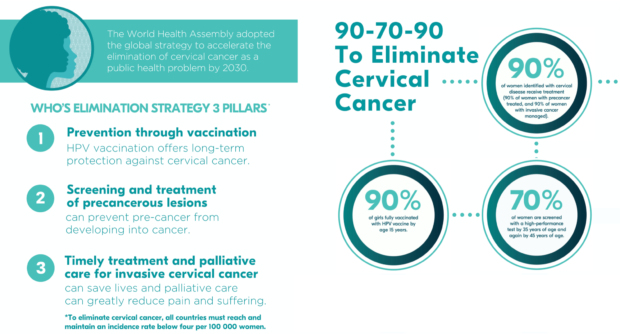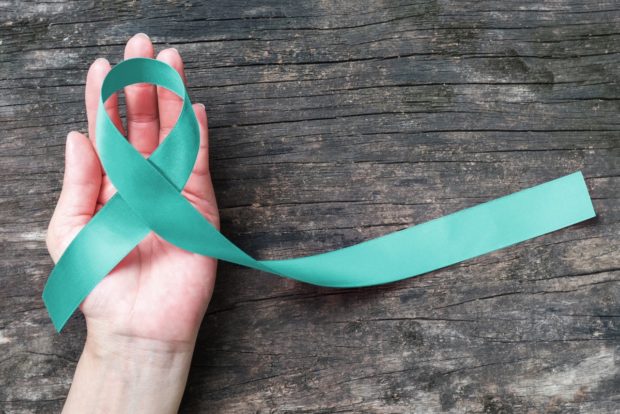LGUs, medical societies, private sector unite in the fight to diminish cervical cancer in the PH
Cervical cancer is the fourth most common cancer affecting women globally, according to World Health Organization (WHO) data. In 2018 alone, an estimated 570,000 women worldwide were diagnosed with cervical cancer, around 311,000 of whom perished from the disease.
“Cervical cancer places such a heavy burden on society,” shares Ronald B. Capito, MD, a gynecologic oncology specialist and a fellow of the Philippine Obstetrical and Gynecological Society (POGS).
In the Philippines, cervical cancer is the second most common cancer affecting women, most of whom are diagnosed during the later stages. Locally, about 7,190 new cases of cervical cancer are recorded each year, with approximately 4,088 Filipinas dying from the disease each year2 (estimates for 2018), shares Capito. “If you look at it another way, 11 Filipinas are dying of cervical cancer every day,” he adds.
Infection with the human papillomavirus (HPV) is a key determinant in the development of cervical cancer. HPV is a virus with more than 100 types. It may cause other diseases such as oropharyngeal cancer, recurrent respiratory papillomatosis, vulvar/vaginal cancer, anal cancer, dysplasias, and genital warts. However, only 13 types of HPV can cause cervical cancer, explains Capito.
Still, it is one of the most common sexually transmitted viruses. Almost all sexually active adults would have had an HPV infection at one point in their lives and may not realize it simply because there are no symptoms.
The good news is that cervical cancer may be prevented through early and regular screening and vaccination. “In this day and age, with all the medical progress, cervical cancer may be preventable,” adds Capito.
United in the fight against cervical cancer
To raise awareness on how to help prevent cervical cancer, different local government units (LGUs) kicked off a series of celebrations last Cervical Cancer Awareness Month. These events came with lectures from medical experts, free HPV vaccination for young girls 9 to 14 years old, and free visual inspection with acetic acid (VIA) for HPV screening.
MSD, in collaboration with different LGUs, joined forces with the Department of Health (DOH) and the Department of Education (DepEd), as well as medical societies organizations like POGS and private organizations such as the Ramon Aboitiz Foundation, Inc. (RAFI), to strengthen the paradigm shift towards eliminating cervical cancer in the Philippines.
Meanwhile, in Quezon City and Cebu City, the Cervical Cancer Awareness Month celebrations were held at Quezon City Hall and Il Corso Lifemalls, respectively, with the common theme of “A Paradigm Shift in Cervical Cancer Care en route to Elimination.” In addition, a ceremonial vaccination was conducted during the Quezon City event, and a “Kalasag ng Kalusugan Commitment Exercise” was held to mark the united efforts of different sectors in fighting cervical cancer and spreading its awareness.
These events reflect the belief that to help reduce and eliminate cases of cervical cancer globally, all efforts must be aligned and accelerated. According to the WHO’s Global Strategy to Accelerate the Elimination of Cervical Cancer, every country must reach the following global targets by 2030:
- Vaccination: 90% of girls fully vaccinated with the HPV vaccine by the age of 15
- Screening: 70% of women screened for cervical cancer using a high-performance test by the age of 35 and again by the age of 45
- Treatment: 90% of women with pre-cancer treated, and 90% of women with invasive cancer managed
The Philippines still has a long way to go to hit these goals. For example, only 9.3% of women aged 25 to 64 have undergone cervical cancer screening, and only 23% have been vaccinated with a complete series since the HPV vaccine was introduced in 2015, shares Capito. “The good news is, we still have ten years to work hard on meeting these goals,” adds Capito.
Local efforts to help reduce the incidence of cervical cancer
The DOH, in partnership with DepEd and the local government, implements several public health programs related to cervical cancer. This includes early screening via, visual inspection using acetic acid (VIA), and HPV vaccinations.
“Getting screened for cervical cancer as early as possible is crucial in helping prevent the disease, especially since it has no visible symptoms until later stages”, shares Van Phillip Baton, MD, Head of the Non-Communicable Diseases Section of the Central Visayas Center for Health Development of the DOH. It may take 15 to 20 years for cervical cancer to develop in women with normal immune systems; he further explains that women with weakened immune systems may take only 5 to 10 years to develop.
The DOH is doubling down on its efforts to screen for cervical cancer. However, according to data from WHO Philippines, only 1 in 10 Filipinas were screened for cervical cancer in the last five years. Furthermore, it was only in 2021 that the national screening program for cervical cancer was introduced. This includes the provision of guidelines for early detection at the primary health care level and a clear referral system from the primary to the tertiary health care level.
The DOH is also doubling down on its efforts for HPV vaccination, especially among children aged 9 to 14. “Vaccination at a young age is ideal; this is when the immune system is at its strongest and induces a robust response from the vaccine, with only mild side effects,” says Baton.
“It’s better before any sexual contact, so they are protected against HPV,” adds Erwin de Mesa, MD, an infectious disease specialist. This is especially true since HPV is transferred via sexual intercourse and skin-to-skin contact in the genital area,” explains de Mesa.
Juliana Gonzalez, MD, Officer-In-Charge, and Eleen Gumpal, MD, Manager of the National Immunization Program of the City Health Office of Las Piñas, encourage people to take advantage of the free immunization programs made available through schools and local health centers.
In 2016, HPV vaccination was included in the national vaccination program of the DOH. However, according to data from WHO Philippines, the national HPV vaccination program coverage among girls aged 9 to 14 years old, its primary target cohort, remains low. In 2020, only 1 in 10 girls, or around 30% of the primary target cohort have received their HPV vaccinations. Of this number, only about 5% were able to receive their final doses of the HPV vaccine.
“It could be because a majority of healthcare workers are still focused on COVID-19 vaccination,” shares Baton. “However, for this year and next, we expect to ramp up our school-based and community-based immunization against cervical cancer.”
Outside of these programs from the DOH, talking to your doctor is still the best practice in getting the correct information about HPV and how to help prevent cervical cancer, reminds Jennifer T. Co, MD, an obstetrician-gynecologist and infectious disease specialist. In addition, Co urges people to refrain from self-medicating or believing in hearsay and fake news, as this could further complicate our understanding and handling of cervical cancer as a disease.
Making a world without cervical cancer possible
“Cervical cancer may be prevented with early screening and proper medical advice. We hope everyone finds the time to go to their local health centers and partner hospitals to regularly do a check-up, not just for cervical cancer, but for other preventable diseases as well,” reminds Baton.
Through the combined efforts of the national and local governments and the private sector, the Philippines is well on its way to help reduce the incidence of cervical cancer and its burden on society. So, get the correct information and talk to your doctor today about early screening, prevention and treatment options for cervical cancer.
ADVT.

